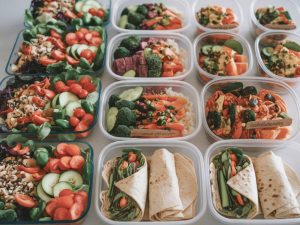How to avoid common nutrition mistakes athletes make

How to avoid common nutrition mistakes athletes make
Understanding the Connection Between Nutrition and Athletic Performance
If you’re an athlete, you probably already understand that nutrition plays a huge role in your performance. But are you truly making the most of your diet? It’s easy to fall into common nutritional traps that might be holding you back. After all, when you’re juggling training schedules, competitions, and recovery plans, nutrition can sometimes take the back seat.
The question is: Are you fueling your body the right way for peak performance? Let’s explore some of the most frequent nutrition mistakes athletes make and how you can avoid them.
Skipping Meals in the Name of Convenience
Life gets busy—this is especially true for athletes squeezing in early-morning training or late-night gym sessions. Skipping meals might seem like a time-saver, but it’s a major mistake. Without consistent fuel, your body struggles to maintain energy levels, repair muscles, and optimize recovery.
Instead, prepare some grab-and-go options that work for your schedule. Protein-packed smoothies, overnight oats, or energy bars can save the day when time isn’t on your side.
Pro tip: Set reminders on your phone to eat regularly, even on hectic days. Think of food as part of your training routine—it’s just as essential as the weights or running track!
Eating Too Little, Even When Training Hard
It’s not uncommon for athletes to unintentionally undereat, particularly when trying to maintain or lose weight. But when you’re not eating enough, you might be robbing yourself of the energy you need to perform at your best. Plus, the risk of injuries and burnout increases without sufficient calories to support recovery and overall health.
To avoid this, calculate your caloric needs based on your activity level. A registered dietitian or sports nutritionist can help fine-tune your intake to align with your goals. Remember, food isn’t just fuel—it’s your secret weapon for resilience and long-term performance.
Overloading on Protein While Neglecting Carbs
Protein is the superstar of recovery, but over-focusing on it while skimping on carbohydrates is a mistake many athletes make. Carbs are your body’s primary energy source, especially during high-intensity activity. Without adequate carbs, your performance will likely suffer, leaving you feeling fatigued and less capable of hitting your training goals.
Don’t fear carbs! Integrate complex carbohydrates like brown rice, quinoa, sweet potatoes, or whole-grain pasta into your meals, especially around workout times.
Think of it this way: Protein helps repair the engine (your muscles), but carbohydrates are the fuel that keeps that engine running.
Focusing Too Much on Supplements
Supplements can be tempting—it’s easy to believe that powders, pills, or shakes might be the key to unlocking your athletic potential. While some supplements can indeed be helpful, many athletes over-rely on them, neglecting the fundamental building blocks of a healthy diet: whole, nutrient-dense foods.
Your body absorbs nutrients best from real food, meaning a plate full of leafy greens, lean proteins, nuts, and seeds will usually beat any supplement. Think of supplements as the cherry on top, not the entire sundae.
Before diving into the world of supplements, consult a professional to make sure you’re choosing what’s truly necessary for your goals.
Failing to Hydrate Properly
Let’s be honest—how often do you think about hydration? Many athletes underestimate how much water they need, especially when training in hot or humid conditions. Dehydration doesn’t just affect your endurance; it can impact strength, focus, and even recovery time.
A good rule of thumb is to drink water consistently throughout the day, not just when you feel thirsty. For longer or intense training sessions, consider incorporating drinks with electrolytes to replace lost minerals.
And a quick trick: If your urine is dark yellow, it’s time to chug that water bottle. Aim for a pale yellow, which indicates proper hydration.
Neglecting Recovery Nutrition
Picture this: You’ve just crushed a long run or an intense workout session. Should you eat now or wait? Many athletes overlook recovery nutrition, missing the critical time window to replenish glycogen stores and repair muscle damage.
Make it a habit to consume a balance of carbohydrates and protein within 30 to 60 minutes post-workout. For instance, try a banana with peanut butter, a turkey sandwich on whole-grain bread, or a classic post-workout smoothie with Greek yogurt and frozen fruit.
Ignoring Individualized Nutrition Needs
Every athlete is unique, and what works for one person may not work for another. Yet, it’s easy to fall into the trap of following generic meal plans or copying what your favorite professional athlete eats. This approach doesn’t take your specific needs, goals, or sensitivities into account.
One size does not fit all when it comes to nutrition, so listen to your body. Are you feeling energized or constantly drained? Experiencing digestive issues? Use these clues as starting points for adjusting your diet.
If you’re unsure where to start, work with a qualified sports nutritionist to create a tailored plan that supports your performance and lifestyle.
Getting Caught Up in Fad Diets
Whether it’s keto, paleo, or intermittent fasting, trendy diets can lure anyone in, athletes included. While some approaches might have their merits in certain situations, restrictive diets often lead to nutrient deficiencies, decreased energy levels, or a compromised immune system.
Instead of focusing on exclusion, focus on inclusion. Aim for a balanced plate full of colorful fruits, vegetables, proteins, and healthy fats. Not only will this keep your body running like a well-oiled machine, but it’ll also make eating more enjoyable.
The Bottom Line on Avoiding Nutrition Mistakes
Navigating your nutrition as an athlete doesn’t have to feel overwhelming. The key is to treat your diet as an extension of your training routine. Pay attention to your meal timing, eat a well-rounded selection of macronutrients, hydrate like it’s your job, and most importantly, listen to what your body needs.
By avoiding these common pitfalls, you’re setting yourself up for stronger performances, faster recoveries, and a healthier, more sustainable athletic journey. And who doesn’t want that?
Now, it’s your turn: What changes will you make to your nutrition strategy? The next time you’re packing your gym bag, remember that your food choices might just be the ultimate game-changer.






